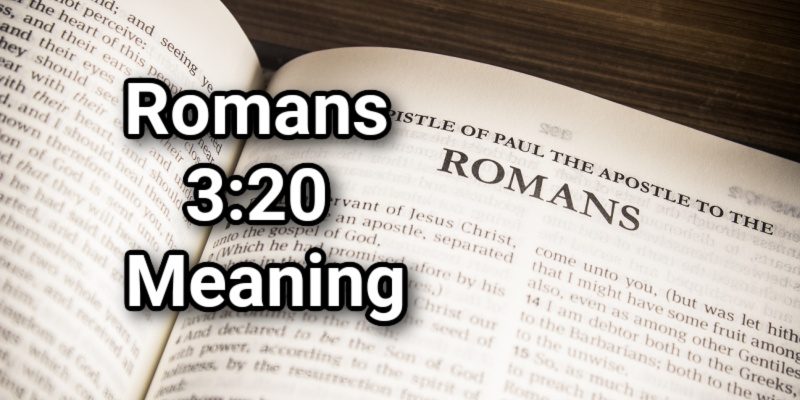Lord’s Library editors offer a Romans 3:20 meaning with commentary and supporting Scriptures for your edification.
Romans 3:20 shows us the futility of attempting to achieve salvation through adherence to the law alone and reveals the need for salvation by grace through faith in the finished work of Jesus Christ on the cross. See Scripture: “Therefore by the deeds of the law there shall no flesh be justified in his sight: for by the law is the knowledge of sin.”
This is a cornerstone of the Gospel message, revealing humanity’s inability to earn justification and pointing to the sufficiency of Christ’s blood atonement. Amen!
The first part of the verse, “by the deeds of the law there shall no flesh be justified,” makes it clear that no amount of works righteousness can make one right before God. This echoes what we read in Isaiah 64:6: “But we are all as an unclean thing, and all our righteousnesses are as filthy rags; and we all do fade as a leaf; and our iniquities, like the wind, have taken us away.”
The Law of Moses, as Apostle Paul explains in Galatians 3:24, serves as a schoolmaster to bring us to Christ: “Wherefore the law was our schoolmaster to bring us unto Christ, that we might be justified by faith.” Its purpose is not to justify but to reveal our sin and our need for a Savior.
Romans 3:20 Meaning
The latter part of Romans 3:20 says: “for by the law is the knowledge of sin.” The law functions as a mirror, exposing the depth of sinfulness in the human heart. Paul elaborates on this in Romans 7:7: “What shall we say then? is the law sin? God forbid. Nay, I had not known sin, but by the law: for I had not known lust, except the law had said, Thou shalt not covet.”
The law reveals sin but offers no power to overcome it or to save; it drives one to the only source of salvation—the Gospel of Jesus Christ.
Paul emphasizes in Romans 3:23: “For all have sinned, and come short of the glory of God;” The inability of the law to justify underscores the necessity of Christ’s blood atonement. Through His finished work on the cross, Jesus fulfilled the demands of the law and provided a way for sinners to be justified by faith.
Romans 3:24-25 explains: “Being justified freely by his grace through the redemption that is in Christ Jesus: Whom God hath set forth to be a propitiation through faith in his blood, to declare his righteousness for the remission of sins that are past, through the forbearance of God;”
Ephesians 2:8-9 plainly confirms this: “For by grace are ye saved through faith; and that not of yourselves: it is the gift of God: Not of works, lest any man should boast.”
Therefore as one can see, faith in Christ’s finished work on the cross, not the deeds of the law, is the sole means of justification before God.
The futility of the law alone to save is highlighted in Hebrews 10:1-4: “For the law having a shadow of good things to come, and not the very image of the things, can never with those sacrifices which they offered year by year continually make the comers thereunto perfect. For then would they not have ceased to be offered? because that the worshippers once purged should have had no more conscience of sins. But in those sacrifices there is a remembrance again made of sins every year. For it is not possible that the blood of bulls and of goats should take away sins.”
Only the perfect sacrifice of Jesus Christ could accomplish what the law could not. It is recorded that Christ said on the cross in John 19:30: “When Jesus therefore had received the vinegar, he said, It is finished: and he bowed his head, and gave up the ghost.”
Romans 3:20 also highlights the universality of the Gospel of salvation. Since no flesh can be justified by the law, justification is equally available to all, both Jew and Gentile. See Romans 10:12-13: “For there is no difference between the Jew and the Greek: for the same Lord over all is rich unto all that call upon him. For whosoever shall call upon the name of the Lord shall be saved.”
As it is written, the Law condemns everyone equally, but the grace of God offers salvation to all who believe.
Lord's Library is a Christian resource hub. Our editors use a variety of internet research methods like search engines, audio and video, AI, consultations with ministry leaders in the field, and more. Lord's Library should never be a substitute for reading your Bible daily as the Scriptures are to be our final authority on all matters. Lord's Library participates in affiliate programs. We may make a small commission from products purchased through this resource.
- The 6 Best 1 Corinthians Commentaries to Read in 2025 - March 24, 2025
- The 8 Best 1 Corinthians Bible Study Books to Read in 2025 - March 24, 2025
- 2 Timothy 1:9-10 Meaning: Commentary on Important Scriptures - March 22, 2025















